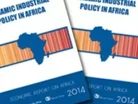[Full Report] Calls for more credible industrial policies from African countries

African countries need to introduce credible industrial policies and promote effective industrial policy organisations to enhance the structural transformation of the continent, says a new report jointly produced by the United Nations Economic Commission for Africa and the African Union Commission.
Transforming Africa's industrial landscape has failed partly because countries used industrial blueprints characterised by lack of dynamism and high level coordination, as well as inadequate consultations with stakeholders, according to this year's Economic Report on Africa.
Until now, says the report, an examination of Africa's failure at industrialisation had ignored the policy processes and institutions governing industrial policy in Africa or the impact of their inherent weaknesses on industrialization.
"Indeed, weak institutional structures and poor policy design have been at the root of Africa's industrial policy problem throughout its post-independence history," the report declares.
The theme of this year's report is Dynamic industrial policy in Africa: innovative institutions, effective processes and flexible mechanisms.
While acknowledging Africa's impressive economic growth in the past decade on the back of better commodity prices, improved governance and increasing domestic demand and trade and investment ties with emerging economies, it says that industrialisation is a "precondition for Africa to achieve inclusive and sustainable economic growth."
Beyond an analysis of the continent's industrialisation problems, and based on the experience of industrialising countries in the global south, the report offers an institutional framework for designing and implementing industrial policy in Africa.
The report recommends that top-level coordination of the industrial policy framework is required to deal with potential problems that could undermine the efficiency of industrial policy.
Making provision for dialogues between public sector and private stakeholders allows governments and the industrial policy organisations to be adaptable to the changing needs of industry, it counsels.
Regarding the provision of modern infrastructure and logistics necessary for industrialisation, the report wants governments with few resources to create "pockets of infrastructure" focused on sectoral or clustering needs of industrial expansion.
It recommends industrial parks as one approach which "provides high potential for growth and value addition as well as for solid linkage development and related spillovers among companies, suppliers and service providers."
The report builds on the previous work of the 2011 edition--on the role of the state in economic transformation--and last year's--on leveraging Africa's comparative advantages in commodities to industrialise.



